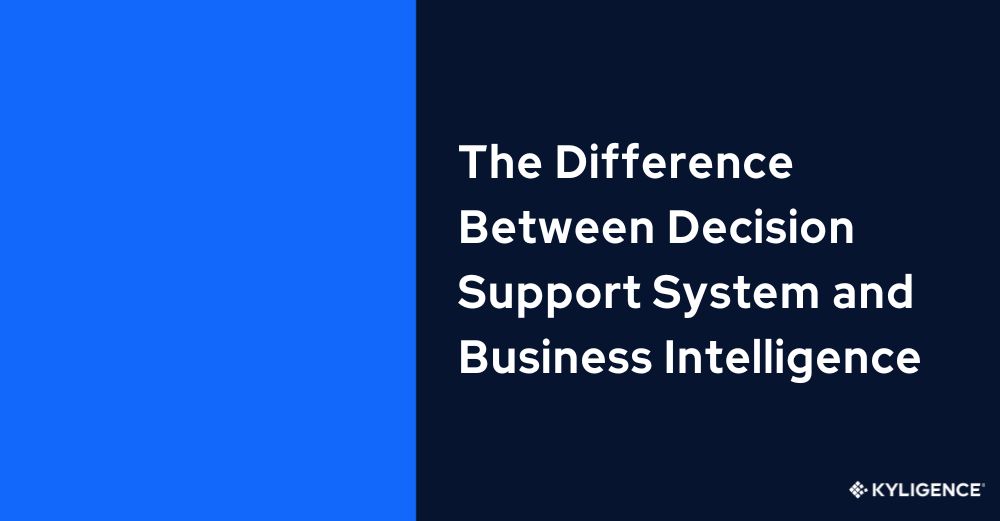Ⓒ 2023 Kyligence, Inc. All rights reserved.

Introduction
In today's data-driven business landscape, decision-making plays a crucial role in the success of organizations. Two key tools that empower businesses to make strategic choices are Decision Support Systems (DSS) and Business Intelligence (BI).
Understanding the difference between decision support system and business intelligence is essential for business professionals, data analysts, and technology enthusiasts alike. And this article is going to discuss exactly that. Stay tuned!
Decision Support System (DSS)
A Decision Support System (DSS) is a software tool designed to aid individual decision-making by providing specific information and recommendations. It leverages data analysis capabilities to help users make informed decisions.
Definition and Purpose
A DSS is a computer-based system that assists individuals in making decisions by analyzing relevant data and presenting it in a meaningful way. It goes beyond simply providing raw data; it also offers insights, predictions, and recommendations based on the available information.
The purpose of a DSS is to enhance decision-making efficiency and effectiveness by reducing uncertainty and improving the quality of decisions.
Functionality and Features
DSS utilizes various software tools to perform its functions. These tools include data mining, statistical analysis, modeling techniques, and visualization capabilities.
By leveraging these tools, DSS can analyze large volumes of data from multiple sources, identify patterns and trends, and generate reports or visualizations that facilitate decision-making.
One key feature of DSS is its data analysis capabilities. It allows users to explore data sets, apply analytical techniques, and generate insights that can guide decision-making processes.
Additionally, DSS provides interactive interfaces that enable users to manipulate variables, test different scenarios, and evaluate the potential outcomes of their decisions.
Use cases: Where DSS Shines in the Business Landscape
DSS finds applications in various industries where quick decision-making is crucial. For example, in supply chain management, a DSS can help optimize inventory levels by analyzing historical sales data, current market trends, and production capacities.
In healthcare settings, a DSS can assist doctors in diagnosing diseases by analyzing patient symptoms against medical databases.
Another use case for DSS is financial planning and forecasting. By analyzing historical financial data and market conditions, a DSS can provide valuable insights into investment opportunities or potential risks.
Business Intelligence (BI)
Business Intelligence (BI) is a comprehensive approach to data analysis that encompasses processes, technologies, and tools to help organizations make informed decisions. It involves the collection, analysis, and presentation of data to support strategic decision-making.
Definition and Scope
BI has a broader scope compared to DSS. It involves various processes such as data collection, data integration, data warehousing, reporting, and data visualization. These processes are supported by technologies and tools that enable organizations to gather, store, analyze, and present large volumes of data in a meaningful way.
Strategic Decision-Making
BI plays a crucial role in supporting strategic decision-making within organizations. By collecting and analyzing relevant data from various sources, BI provides insights into market trends, customer behavior, operational efficiency, and financial performance.
These insights enable executives and managers to identify opportunities for growth, optimize business processes, allocate resources effectively, and mitigate risks.
The collection of accurate and timely data is essential for effective BI implementation. Organizations need to ensure that their data is clean, consistent, and reliable in order to derive meaningful insights from it.
Once the data is collected and analyzed using BI tools, it can be presented through dashboards or reports that provide real-time visibility into key performance indicators (KPIs).
Use cases: How Businesses Leverage BI for Competitive Advantage
Businesses across industries leverage BI to gain a competitive advantage. For example, in the retail industry, BI can be used to analyze customer buying patterns and preferences based on transactional data. This information can then be used to personalize marketing campaigns or optimize product placement within stores.
In the financial sector, BI can help banks and investment firms analyze market trends and customer behavior to identify potential risks and opportunities. This information can guide investment decisions, risk management strategies, and customer relationship management initiatives.
Key Differences between Decision Support System and Business Intelligence
When comparing Decision Support Systems (DSS) and Business Intelligence (BI), it is important to understand their purpose, focus, and functionality.
Purpose and Focus
Decision Support System
The primary purpose of DSS is to aid individual decision-making. It provides specific information and recommendations that help users make informed choices. DSS focuses on supporting the decision-making process at an operational level, providing insights into immediate concerns or problems.
Business Intelligence
On the other hand, BI has a broader scope and supports strategic decision-making within organizations. It encompasses processes, technologies, and tools that enable data-driven insights for executives and managers.
BI helps organizations analyze large volumes of data from various sources to identify trends, patterns, and opportunities that can drive business growth.
Functionality
Business Intelligence
One key difference between DSS and BI lies in their functionality. In the context of BI, data warehousing plays a crucial role. Data warehousing involves consolidating data from different sources into a central repository for analysis. This allows organizations to have a unified view of their data across departments or business units.
Reporting is another essential feature of BI. It enables users to generate standardized reports based on predefined metrics or custom queries. These reports provide stakeholders with valuable insights into key performance indicators (KPIs) that drive decision-making.
Data visualization is also an integral part of BI functionality. It uses charts, graphs, dashboards, and other visual representations to present complex data in an easily understandable format. This helps users quickly grasp trends and patterns within the data.
Decision Support System
In contrast, while DSS may incorporate some elements of reporting or visualization, its primary focus is on providing specific information for individual decisions rather than comprehensive analysis or presentation capabilities.
Conclusion
Understanding the differences between Decision Support Systems (DSS) and Business Intelligence (BI) is crucial for businesses, data analysts, and technology enthusiasts.
While DSS focuses on aiding individual decision-making by providing specific information, BI has a broader scope and supports strategic decision-making through comprehensive data-driven insights.
By leveraging both DSS and BI, organizations can benefit from the strengths of each system. DSS provides immediate support for operational decisions, while BI offers a more holistic view for strategic choices. Together, they empower businesses to make informed decisions at all levels.
To fully explore the potential of their data insights, businesses can try Kyligence for free today. Kyligence provides decision intelligence solutions that enable organizations to unlock the full value of their data and drive growth in an increasingly competitive business landscape.
